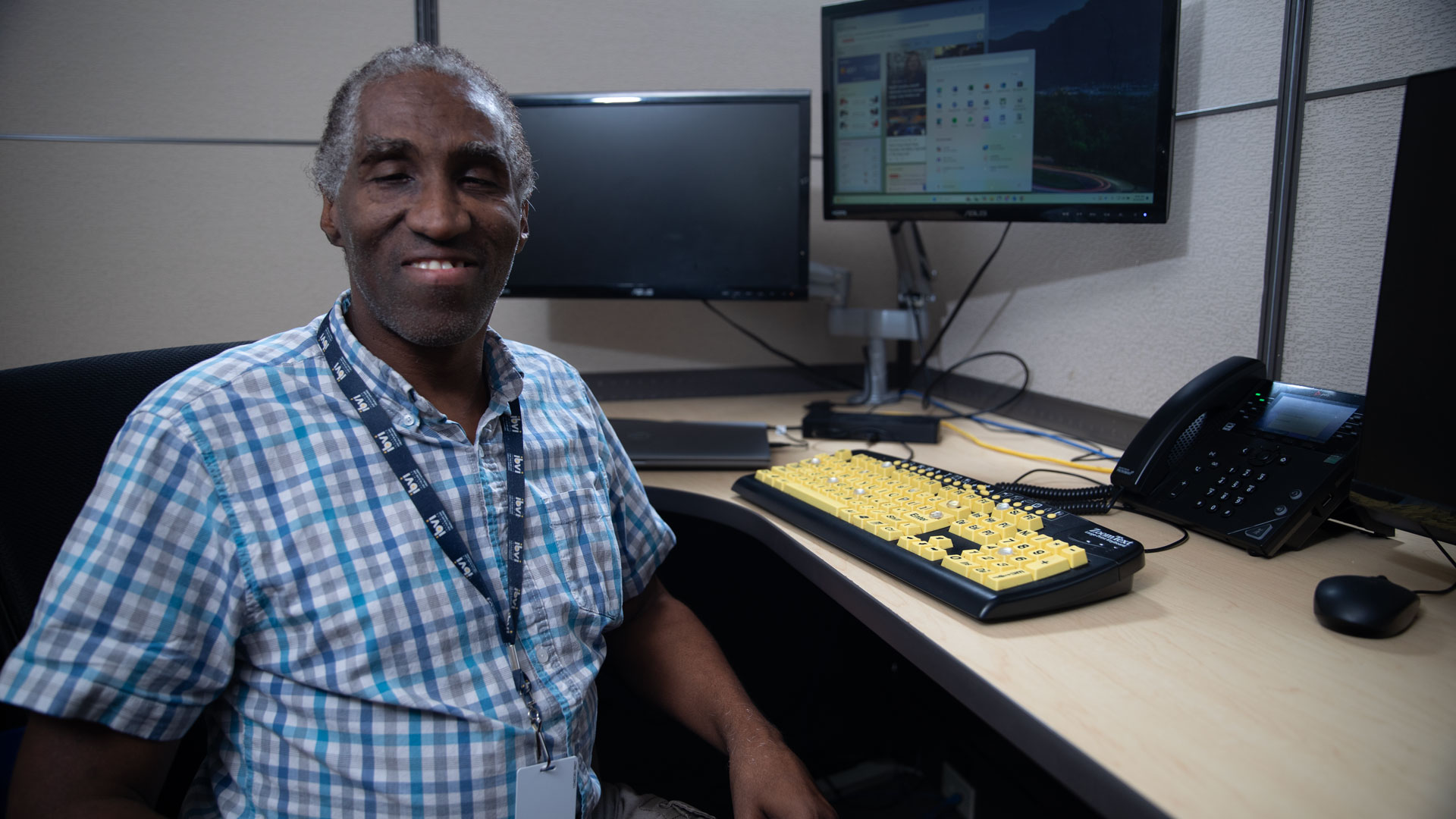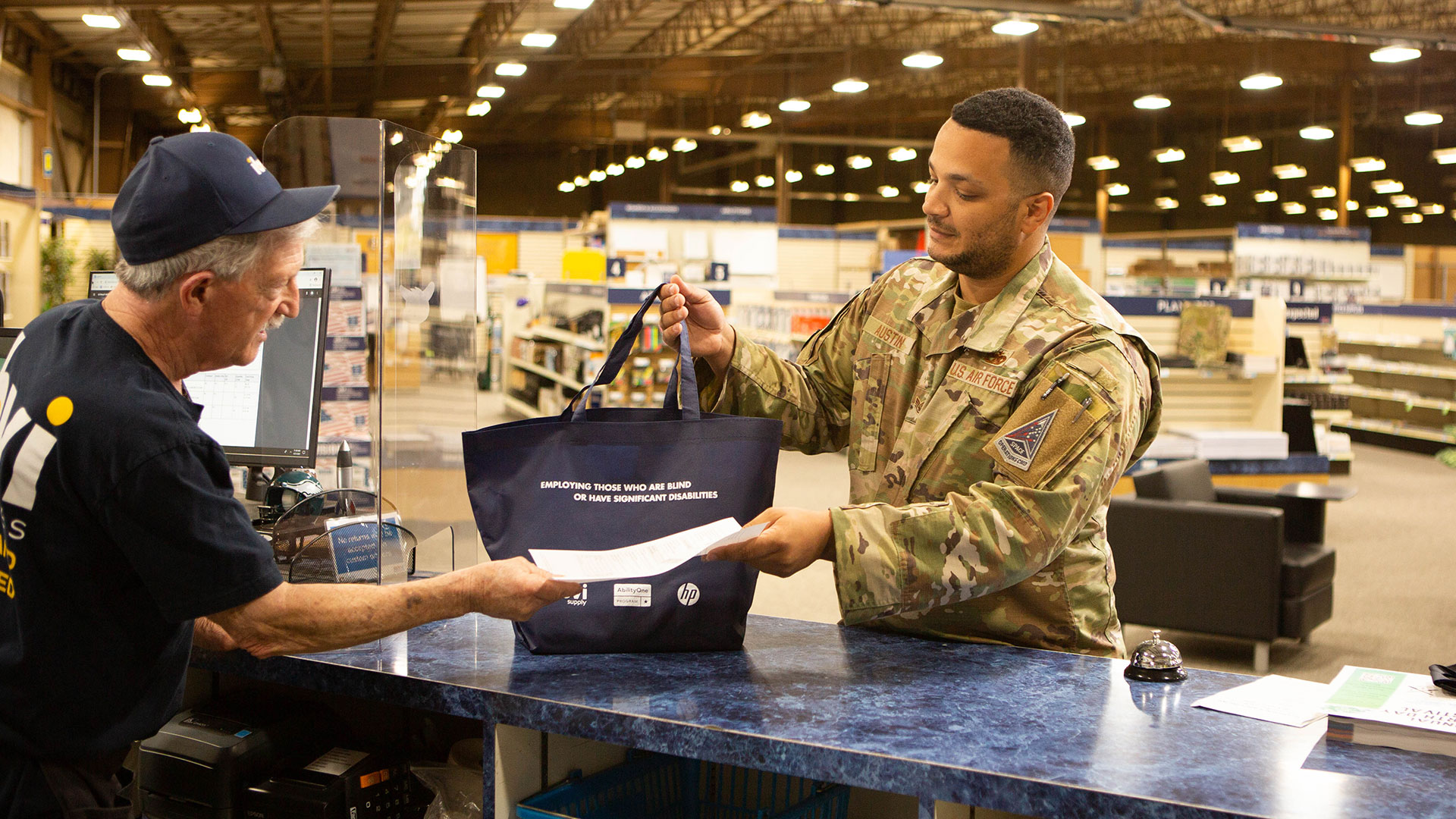Today’s job market is highly competitive for all job seekers. Unfortunately, no one has felt the impact of this job market more than disabled professionals. In fact, blind and visually impaired individuals currently have an unemployment rate of 70% – a whopping 14x higher than the national unemployment rate.
As an organization that’s committed to providing meaningful employment opportunities to blind and visually impaired professionals, it is our goal to change that statistic. With that in mind, we turned to Connie Knutson, HR Manager here at IB Milwaukee, and asked her to share some insights. She took the time to sit down with our Blind Living Radio team to graciously share some wonderful tips and resources for blind and visually impaired job seekers.
Click here to listen to the Blind Living Radio episode.
Starting your job search
When searching for prime job opportunities, it pays to go the extra mile. In addition to scouring large hiring sites like Indeed and CareerBuilder, Connie advises job seekers to spend some time networking both online and offline. In fact, she says that those who limit themselves to such websites may miss out on some excellent opportunities.
Connie advises spending some time on sites like LinkedIn, saying, “Social media is really starting to enter the marketplace as a great way to look for a position. You can even use before an interview to research a company.”
Of course, real-life networking also has huge benefits. She also advises job seekers to look for professional organizations related to their industry, like the American Marketing Association, for example. These organizations host plenty of meetings and events, giving you the opportunity to get out and network with other professionals in your field.
For those looking for job listings geared specifically towards blind or visually impaired professionals, she also suggests visiting both NIB and AFB’s websites. And, of course, our job listings are continually updated with new opportunities both here at our Milwaukee-area locations as well as across the U.S.
How to land a job interview
Applying for jobs can be a long, drawn-out and repetitive process. However, it’s important to give your all to every single application you fill out. Not only is it important to ensure that your resume is nicely formatted and easy to read, but it’s important to fill out every form and answer every question. Unfortunately, many people incorrectly assume that submitting their resume saves them from having to fill out an online application. However, failing to do so can hurt your odds of getting an interview.
“It shows interest level,” Connie says. “If you’re not going to take the time to update your resume or fill out the application completely, then I feel like you’re not really interested in that position.”
If you’re unable to complete the application process on your own, don’t hesitate to ask the recruiter for help! “Here at IB Milwaukee, our main goal is to find qualified blind people for our open positions, so if somebody needs assistance in filling out an application that is something we would provide them with,” Connie explains.
What to expect from a telephone interview
Telephone interviews have become standard at many companies, including ours. They give the recruiter an opportunity to further screen a handful of candidates before bringing them in for an interview. On a phone screening, the recruiter will be looking for several things: they want to hear how professional a candidate sounds on the phone, get an idea of the experience and skill level, and also see if they sound truly interested in the position.
Make sure you prepare for the phone screening just like you would an in-person interview. Before your call, prepare a list of talking points. Connie highly suggests taking another look at the qualifications listed in the job post, and be sure to highlight those particular skills while talking to the recruiter. “That’s really what they’re going to be looking for to pass you along to the next round in the recruitment processes,” she says.
Also, it’s crucial that you take time to do research on the company. You should know what the company does, who their clients are, and so on. In addition to visiting the company’s website, Connie suggests researching the company and its employees on LinkedIn.
Finally, it’s important to make sure you’re in a quiet location for your telephone interview. If you’re at home, make sure you’re in a place where noise from kids and animals won’t interrupt your conversation.
How to have a successful face-to-face interview
Your job interview begins the moment you step into the building. Plan to get to your interview earlier than necessary to allow for any transportation hold-ups, particularly if you’re taking a transit van or public transportation. Running late due to transportation issues? Connie stresses the importance of calling your recruiter and letting them know.
In addition to planning ahead for transportation, you’ll want to arrive at your interview prepared with the following:
- Several hard copies of your resume
- Contact information for your professional references
- A list of questions for your interviewer
You will also want to come prepared with a few success stories that you can share with your interviewer. These stories should highlight the ways in which you’ve provided value to your past employers. If possible, include results. For example, “my plan allowed the department to reduce processing time by 20%.”
Also Connie stresses the importance of viewing this time as a two-way interview. “Make sure this is a place you want to work!” she says. “Put together a list of questions, and ask about things that are important to you.” Also, she says it’s a good idea to take notes if necessary – particularly if your interviewer is telling you more about the business.
After the interview, be sure to send a thank you note. Not only is it good etiquette, but it also gives you an opportunity to ask questions or share any info you may have forgotten to include. According to Connie, it’s fine to send your thank you note via email. In fact, it may actually be your best bet, as hiring decisions can be made fast. “The quicker you get the note out, the better, as it shows you’re interested.” she says.
When is the right time to mention your vision loss / blindness to a prospective employer?
This is a personal decision that each job seeker will need to make on their own. Employers have to follow guidelines on what they can and cannot ask prior to a conditional offer of employment being extended. However, if it is obvious to the employer that the candidate has a visual impairment, they can ask some specific questions during the interview process to determine if the candidate can perform the essential functions of the position. They also can ask what types of accommodations may be necessary in order for the candidate to perform the essential duties of the job. After a conditional offer is made, an employer definitely can discuss accommodations with the job seeker.
Here at ibMilwaukee, we (and organizations like ours) are committed to hiring individuals who are legally blind and visually impaired. It’s embedded in the mission of our organization, therefore many of our job seekers discuss what accommodations they need during the interview process. If it’s not discussed at that time, we normally discuss it after a conditional offer of employment is extended.
What is the best way to broach the topic of accessibility tools / needs with a potential employer?
The best approach is to openly discuss the topic with your manager or a member of the Human Resources team. Some companies may be informal, but many others have a formal process that includes requesting the accommodation in writing and submitting information from your physician confirming the disability and that the specific accommodation being requested will assist in performing the essential functions of the job. Then, your employer will determine if they can accommodate the request. Usually, the company works on finding a workable accommodation directly with the employee. Sometimes it takes time to talk through possible solutions, and the employee needs to be flexible in this process. At times, the company may propose an alternate solution to meet the accommodation request.
Additional Tips and Resources For Blind and Visually Impaired Job Seekers
Utilize your local Division of Vocational Rehab
The Division of Vocational Rehab has locations in every state and offers a plethora of free training programs for disabled individuals, including blind and visually impaired professionals. This is a great resource for anyone looking for assistance in their job search.
Contact the VisionForward Association (Milwaukee)
If you’re located in the Milwaukee area, we highly recommend the VisionForward Association. They provide a wide array of services to blind and visually impaired individuals, including technology training.
Explore the American Federation for the Blind’s Job Search Guide
The AFB has an incredibly in-depth job search guide available on their website, created to help blind and visually impaired professionals through every step of the job hunting process.
Explore job sites geared towards blind or disabled professionals, such as:
- National Industries for the Blind’s Career Page
- American Federation for the Blind’s Job Listings
- American Council for the Blind
- Workforce Recruitment Program (for students and recent grads)
For even more tips and insights, check out this week’s Blind Living Radio interview featuring Connie Knutson. Blindlivingradio.com


